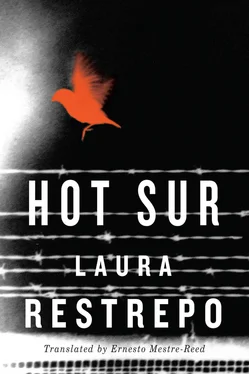You may ask yourself if I thought about escaping. Yes, I did. These days, it is the only question that matters. But it bounces back; I can’t complete the thought before it turns on itself. It’s trapped inside my head, booming and echoing off the walls of my skull but futile. There’s no way to escape from Manninpox, that’s the truth. As much as I turn it over in my head, I can’t figure it out. Although, sure, I imagine it, my cells and neurons scheme, plotting somehow and some way they can make it real. It’s a given that I won’t be able to escape in body, that is, whole, with my eyes, my hair, my bones, my flesh. The only part of me that can leave is my blood, which runs free and can be found again some place far off. And there it goes, there goes the trail of my blood, dripping, slipping, draining, drop by drop searching for the light of day, finding little holes in which to seep, slipping between the rocks, passing through bars and cracks, filtering through walls, sliding past the feet of guards, without excusing itself or drawing attention, not setting off the alarms. This is the only way I can return to the world of the free. A thin stream of blood crossing the field, I run softly on the highways and traverse the woods until I reach the home for special-needs adolescents where Violeta is. From a distance, I see her seated under those ancient trees that soothe her mind, and I watch her, looking at her while she’s looking within. Then I approach her to ask for forgiveness. It’s all my fault. Violeta, I’m going to come for you, little sis. I’m going to take you with me; from now on, we will be together forever. No one or anything will disrupt our plans; I swear by Bolivia that I will keep my promise if you forgive me. I will keep it. I will survive only to keep that promise to her. I tell her that, and that she has to wait for me a little while longer, to have patience while I pass through the place planted with crosses and covered in snow where my mother rests, pretty mamacita. I tell her as well. I’ve come to ask forgiveness for what? I don’t know. Because I haven’t done anything to you, Mami. I’m innocent of what I have been accused. But you know how the mind works. The sense of guilt can be strong even if one is not guilty. So I’ve come to ask for your forgiveness and leave you roses and that’s it, I suppose, because in the end, with you being dead and all, there’s not much you can contribute at the moment. So what can I expect from you? Or maybe, this is funny, I’ll scratch on your gravestone, “Mother, I don’t deserve you, but I need you.” That’s the phrase that Margarita has tattooed on her arm, a Peruvian inmate who is as sentimental as you were, and everyone here mocks her for it. And then I run, a trail of blood now a little more lively, a little lighter, until I get to my house to open the windows to let the sun and air in, and I stay awhile looking at my things, my high-school diploma, the letters from Cami and Pati, pictures of when we were girls, my white crocheted cushions, my bedroom decorated in mint green, my farmed pearls, the box of Swiss chocolates my friends at work just gave me. And I ask my dog Hero to forgive me, that above all, to forgive me, because I’m not sure if he survived after I abandoned him. I ask him who fed him after I left. Come here, little doggy, I’ll never leave again, I assure him, scratching his belly. He believes me and peacefully goes to sleep on my bed. That’s what I’d do out there, Mr. Rose, when they let me go, if they let me go one day, or when I escape: I will take Violeta and Hero, and the three of us will live our day-to-day life, the good life, that is. That’s what I’d do, the same as ever. Because here inside, it is those normal things, the most routine ones, that kill you with nostalgia. But it won’t be easy. When I get out of here it will not be easy at all to deal with the world. The men who broke into my apartment destroyed everything. Everything they touched, they soiled. They pissed on the mattress and the sofa, put my things in black plastic bags, and handled them as if they were removing dead bodies. They ripped up the carpet, pulled down the curtains, and tore open the upholstery, broke bottles, emptied boxes, and broke apart my house and left the door open as if it were a bar, so anyone could just go in. But I don’t remember much of that, and if I don’t remember it, it’s because it didn’t happen. I like to imagine that my house is waiting for me as it always was when I left in the mornings, the bed made, everything in its place, clothes ironed, the floors mopped, the rug vacuumed, the bathroom impeccable, and the first thing I’ll do when I get back — well, the second thing, after taking care of Hero — is to make myself a hearty breakfast to soothe the hunger that has built up. Fresh-squeezed orange juice, café con leche, pancakes, Aunt Jemima syrup, and fruit, a lot of fruit, strawberries and peaches and apples and papaya and mango and cherimoya, and also some perico scrambled eggs Colombian-style, with diced tomatoes and green onions, and a bagel with cream cheese, and also toast with butter and peanut butter. And a big glass of Diet Coke with a lot of ice. All that? Yes, all that. I’m going to put all that on a tray with one of the embroidered linings that I inherited from Bolivia, and I’m going to have breakfast in bed, no hassle, in my pajamas watching reruns of Friends . And another thing. When I get out of here, will I go looking for Greg? Sleepy Joe? Would I like to see them again? Good questions. But to tell you the truth, I think the answer is no. Neither of them. I don’t even think about reuniting with Greg or with Joe. I barely remember them, perhaps because I blame them for a lot of things. My memory has become whimsical, Mr. Rose, it keeps what is clear and discards what is blurry, it sticks to the past and rejects the present, and seemingly, it liberates itself from what it finds intolerable or incomprehensible. Maybe it would be best to leave Greg and Sleepy Joe where they are, swallowed by oblivion. The entire current of my thoughts, or almost all of it, flows toward Violeta; she takes up all of my memories, the past and what is to come. I have a debt with her. You understand? With Violeta. A huge, crushing debt. I have to take her out of that home for autistic adolescents where I left her against her will. I have to get out of Manninpox to fulfill my promise to her. You’ll see, Mr. Rose, all this is not impossible, my escape plan, I mean. I have started to execute it as we speak. Becoming a stream of blood is already happening.
It’s as if I unplugged something and I’ve begun to empty. As if because I could not escape past the walls, I’ve begun to escape from myself. But don’t think I’m attracted to the idea of dying. I’ve tried to stop the hemorrhaging with compresses, drugs, spells, yoga, prayers, and even cotton balls coated in arnica and ginger. All for nothing. I started with this whole drama right after I arrived in Manninpox, in the dining room during lunch. They had assigned me a permanent spot at one of the tables, which are long, for eight or ten prisoners with adjoining benches. That day I finished eating, picked up my tray, and headed for one of the corners, where we have to turn them in before the bell rings, and as I was doing this I noticed that the others opened a path before me. They had already warned me that one of the most dangerous moments in here is when you are walking with both of your hands busy carrying the tray, which is when they can jump you. If somebody wants to fuck you, that’s when they can do it, stab you in the side and disappear into the mayhem that ensues. I don’t know if they ever told you, but Piporro (do you remember Piporro, who came to your workshop a couple of times?), she was carrying her tray, and they pierced her with the long sharpened handle of a plastic spoon. Nothing like that was happening to me. I panicked because of the opposite, when I noticed that everyone was moving aside to let me pass. I felt as if they were watching me with disgust and thought they were going to hit me. That’s the sensation I had. In jail, intuitions like that come all of a sudden, like getting sucker-punched. The certainty of danger is physical, the warning from the body, not the mind. I was always aware of the eyes of the others, terrified to be looked upon with hatred or to be looked at too much. I needed to know how they were looking at me to know what to expect. But the longer you’re here, the more you come to understand that the eyes are less important than the hands. What you must never grow careless about are the hands of others, because that’s how aggression is expressed. Keep a close eye on anyone with her hands behind her or in her pockets. The real danger is always in the hands.
Читать дальше












